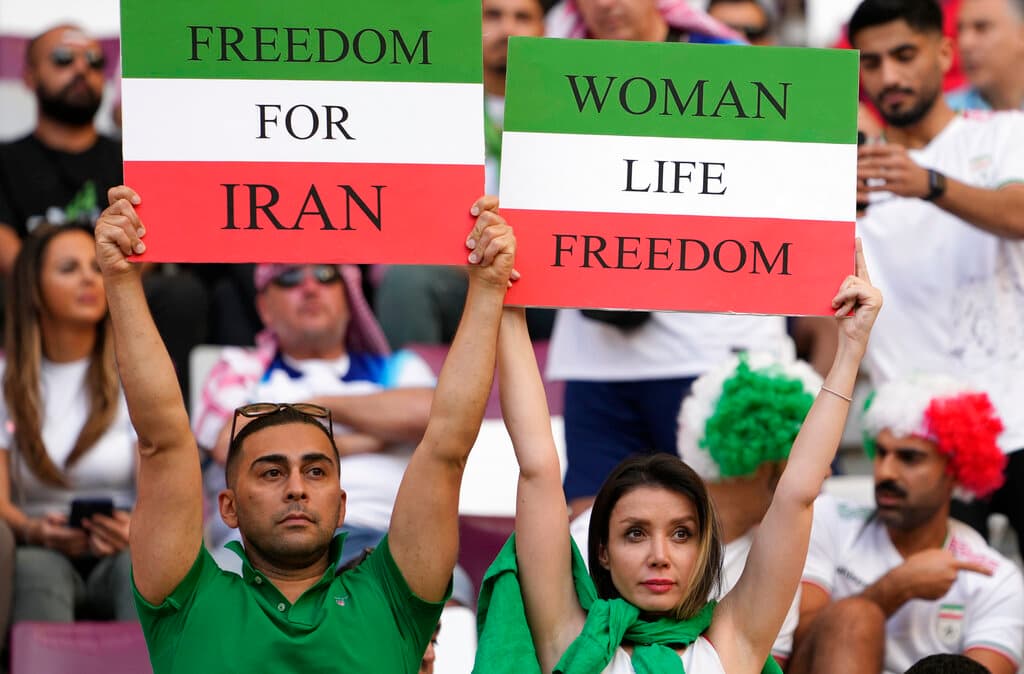World Cup Could Prove a Tipping Point for Iran Revolution
The Iranian soccer players defied the regime by refusing to sing their national anthem before today’s match, a strong nod to the revolutionaries. Will America and Europe follow suit by cutting diplomatic ties with the mullahs?

With Iran’s participation in the World Cup drawing the entire soccer-watching world’s attention to the ongoing Iranian revolution, the besieged Tehran regime is running out of scapegoats to blame for the people’s hatred of the mullahs.
In a sign of support for the revolutionaries, the Iranian squad stayed mum while their country’s national anthem was played at the World Cup in Qatar. Fans in the stands were seen booing the “Sorude Melliye Jomhuriye Eslâmiye Irân,” the national anthem adopted in 1990, before the team was demolished by England, 6-2. Outside the stadium, Iranians chanted, “Death to Khamenei” — referring to the Islamic Republic’s supreme leaders.
Diaspora Persians who had planned to root against the Iranian team are reconsidering now that the players, long lionized by the regime, took a stand and sided with the freedom-yearning rebels back home.
“We have to accept that the conditions in our country are not right and our people are not happy,” the Iranian team captain, Ehsan Hajsafi, told reporters before the game, voicing his support for the more than 400 protesters who have died so far in what has become a full-fledged revolution.
“I looked at the players’ faces and I thought they were grief-stricken,” an Iranian-American author and essayist, Roya Hakakian, told the Sun. “This is such a significant moment because the eyes of the world are on this. It will definitely be welcomed by the people, because they want the world to know. It is more effective than all the CNN coverage of Iran.
“The players took everybody by surprise.” Ms Hakakian said. Her soccer-loving 17-year-old son, Elia, said that while players have expressed solidarity with rebels abroad in the past, they also paid fealty to the regime at home. “Before today I wasn’t rooting for them,” he said, but now perhaps he will.
The players’ decision to decline to sing the anthem at the world’s most-watched sporting event should certainly worry Tehran. It is likely to further encourage the revolutionaries even while the regime becomes more aggressive by the day as its hold on power teeters. As the rebellion intensifies in its third month, nearly 17,000 people have been incarcerated; their ultimate fate includes possible executions.
Violent street confrontations, including attacks on regime enforcers, have become commonplace across the country’s urban and rural areas. Unconfirmed reports of cracks within the regime have started to filter out as well. Some Tehran bigwigs have family members in the burgeoning anti-regime throngs, and according to sources in Iran there have been defections to join the rebels’ ranks.
The most devastating assaults against the protesters are seen in areas populated by ethnic and religious minorities. Arabs, Baluchis, Bahai adherents, and other non-Persians are being attacked ruthlessly. The revolution erupted after the killing of a young Kurdish-Iranian, Mahsa Amini, for improperly wearing her mandatory hijab. Now, Kurdish areas are being attacked mercilessly.
In the 1940s, Iran’s Mahabad became the first city in the Mideast to declare Kurdish independence. Now it is one of the places where the regime’s oppression is harshest. Many Kurds have fled to the nearby Kurdish autonomous zone of Iraq, where Iranian Kurds established bases decades ago. That is no effective refuge, though: The Iranian military now bombards Iraqi Kurdistan almost daily.
“Iran’s repeated violations of the sovereignty of Iraq and the Kurdistan Region of Iraq are inexcusable and a gross infringement of international law and neighborly relations,” the Iraqi Kurdistan regional government said in a statement this morning, following last night’s latest missile attack.
Since establishing the Islamic Republic, Tehran has sought external enemies whenever cornered, a Kurdish Iraqi source told the Sun. “They’re always looking for a scapegoat. The anti-Zionist line worked at first, but now it no long does. Iranians aren’t buying it, so the regime is trying to pretend the current uprising is a Kurdish, rather than an all-Iranian, revolution,” he said, speaking on condition of anonymity.
Americans and Europeans are slowly awakening to the possibility that this uprising may well end the mullahs’ hold on power. President Macron has recently met with one of the first women to rebel against the mandatory hijab, Masih Alinejad. Afterward, Mr. Macron started referring to the events in Iran as a “revolution.” America is yet to follow suit.
Ms. Alinejad and other Iranians have long argued that one of the clearest signals of support would be to end all diplomacy with the Islamic Republic — expel ambassadors and other diplomats, and officially end the attempt to revive the 2015 nuclear deal.
Washington now says it is not currently pursuing the nuclear deal. It has also condemned Tehran’s sales of drones and missiles to Russia in violation of the deal. Yet, America is yet to officially pull the plug on the diplomacy surrounding the nuclear deal by revoking the United Nations Security Council resolution that endorsed it.
Perhaps the fact that even Iran’s own national athletes now seem to disavow the Islamic Republic would move America to fully support a Persian regime change.

